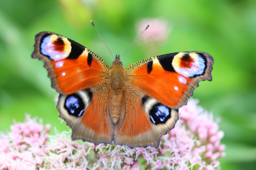| Thursday 16th January, 2020 6.00 to 7.00pm |
|
| The Linnean Society of London |
|
| Map Travel | |
I will be holding a meetup sign at the wine reception. |
|
| Yes 1 |
Maybe 0 |
No 0 |
Biodiversity Winners and Losers from Climate Warming

The climate is changing and many species are shifting their distributions, expanding northwards as new areas become suitable, but disappearing from other locations that become too hot and dry. Britain has a wealth of information about changes in biodiversity over many decades because of the general public’s fascination with recording animals and plants—and butterflies are a particular favourite. Such information helps us examine species’ responses, and the factors responsible for variation among species. This talk examines recent patterns of climate-driven range changes among species, and how this knowledge is being used to inform conservation.
Conservation to improve habitat connectivity can help species reach new areas, and habitat management can help prevent climate-driven extinctions, thereby helping to reduce biodiversity losses. Recent media reports about ‘insectageddon’ together with the IPBES estimate that 1 million species are threatened with extinction, makes it imperative to understand which species are winners and losers in the Anthropocene.
- This event is free and open to all.
- Registration is essential. Seats will be allocated on a first-come, first-served basis.
- Doors will open at 17:30.
- Tea will be served in the Library from 17:30 and the event will be followed by a white wine reception.
Jane Hill is a Professor of Ecology in the Department of Biology at the University of York. Jane is a trustee of the SE Asia Rainforest Research Partnership, and a trustee of the British Ecological Society. She received a Marsh/ZSL Award for Conservation Biology in 2011, and is an Honorary Fellow of the Royal Entomological Society. Jane is also involved in promoting women in science; leading the York Biology Department to an Athena SWAN Gold Award.